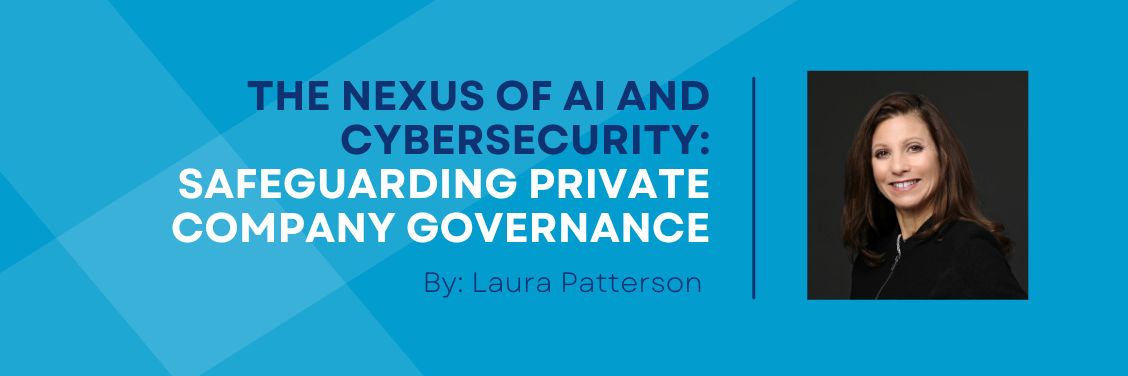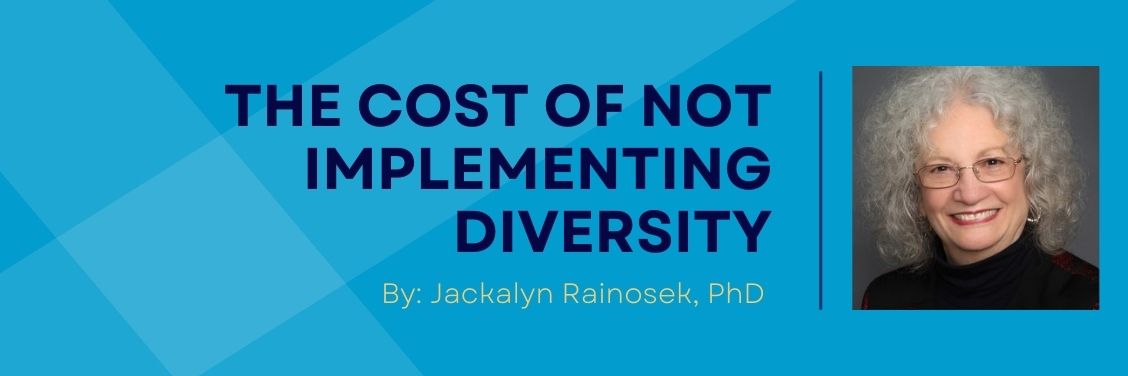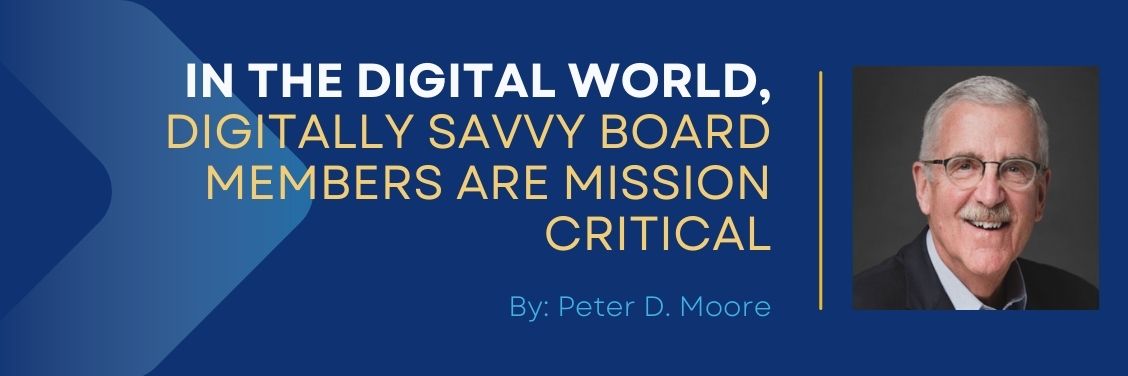Board Governance Insights Blog

In today's digital age, where every company increasingly relies on data and technology, the intersection of artificial intelligence (AI) and cybersecurity is a critical and evolving battleground. As organizations navigate the complex landscape of threats and vulnerabilities, the role of AI in enhancing cybersecurity is going to increase and as a result will impact private companies and their governance.

Research by Forbes shows that delivering messages via storytelling can be up to 22 times more memorable than merely relying on just facts. And that's the reason to have this educational conversation on the Five Cs of great storytelling. To get going, let’s take a walk through each of the Cs and consider the different process steps that transform the delivery of a message through the art of great storytelling.

In the complex and ever-changing world of business, private company boards of directors face a multitude of challenges, from navigating regulatory landscapes to mitigating emerging risks. In this dynamic environment, internal audit emerges as a critical asset, providing invaluable insights and guidance to enhance governance, strengthen operations, and achieve strategic objectives.

Consider that OpenAI’s ChatGPT is … barely a year old. Yet recently, there’s been tremendous focus on AI (Artificial Intelligence) and regulating it. The key question is what does, and what will, AI oversight mean to board members in the short and long term?


Questions to Ask in the Boardroom
- What are five values that are defined and utilized to support the board’s mission?
- How do board members identify their actions and behavior in the board meetings that show appreciation for the board values?
Taking the Next Step
I have another exercise I do with boards that continues the process of bringing members together by helping them to coalesce around a common set of values. These board values are based on board members first identifying their five most important personal values and then identifying a set of shared values from everyone’s personal values meant to guide the actions of the board.

Private companies typically do not audit their books unless an outside party requires it. Audits are a material expense and require great effort.

The ascent of Artificial Intelligence (AI) from a mere buzzword to a transformative powerhouse has been swift and all-encompassing, spanning various industries. Yet, this progress has brought to the fore a crucial concern – AI equity. Once a subject of philosophical debates, AI equity has evolved into a strategic imperative that resonates deeply within the domain of corporate governance. Beyond its ethical dimensions, AI equity now encompasses legal adherence, strategic significance, and the nurturing of stakeholder confidence. This piece delves into the multifaceted significance of AI equity for both private and public company boards, examining its strategic implications, legal obligations, and its role in fostering transparency and accountability.

AI is here to stay, and it’s incredible. But it also comes with terrifying risks that we’ve heard about in the press including IBM’s Watson, who debuted on Jeopardy in 2011, and then later in 2021, in the Healthcare space, failed sometimes under 50% of the time against human clinicians. (https://www.theregister.com/2022/01/31/machine_learning_the_hard_way/).

In today's rapidly evolving digital landscape, the governance of private companies faces unprecedented challenges in safeguarding sensitive data, maintaining customer trust, and complying with an array of regulations. As technology continues to transform industries, the importance of a robust security framework cannot be overstated. This article explores the significance of adopting reputable security frameworks, such as the National Institute of Standards and Technology (NIST) framework, in the governance of private companies.

Renowned Association Management Executive Chosen to Lead National Association Dedicated to Serving Private Company Boards and Directors

Questions to Ask in the Boardroom
- Each board member has resources to bring to the discussion and interactions of a board. What ways do board members contribute to the diversification of board discussions?
- What concerns do board members express about being a diverse board?
- How does telling personal stories about their experiences with DEI help to create an environment where the board members will share more about diversifying the board?
Introduction
As an Organizational Development professional, I have over 50 years of experience designing Diversity, Equity, and Inclusion (DEI) initiatives and providing programs for boards and their organizations. One of the most important actions I can take is to find a thoughtful way to identify how the personal histories of the board members can be a resource in the initial stages of a DEI effort to create a more diverse board. This article will give you ways to open the discussion about personal histories and resources that are present in your board.

Association Cross Pollination
How will you find an unpublished board position? The answer is almost inevitably, “Networking.” How will you find that talented CEO you need to hire? Again, “Networking.” There are few things more fundamental in the world of business than networking. If finding the right opportunity is a numbers game, then more networking will expand the surface area of “luck.”

Boardrooms continually face seemingly unending governance, disclosure, regulatory and legal challenges related to digital systems risk. This is exacerbated by the rapid adoption of AI; a digital technology society is just beginning to grapple with and understand. AI is another, but much more powerful digital tool being added to the digital tool arsenal which businesses must employ to compete. These tools have evolved rapidly from segmented IT functions into the central nervous systems controlling the most vital assets and systems in all sectors of the economy, both private and public regardless of the nature or size of the enterprise. Highly sophisticated AI tools clearly magnify cyber-risk. In addition, they also introduce new, much more complicated risks which are perhaps more consequential than cyber-risk. Among the many examples are the introduction of biases, unintentional violation of laws and regulations, data exfiltration and erroneous decision making. The growing complexity and ever-changing persistent nature of AI and cyber-risk is daunting, seemingly overwhelming, and hard to understand. Boards are on the defense dealing with digital systems oversight.

Questions to Ask in the Boardroom.
- What kinds of behaviors do you see in your board members that show they are resistant to change?
- How do they block efforts to diversify the board?
- Boards that function at a high level of performance are a high performing team. What would board members say about their team process?
Reasons Board Members Stay Stuck and Avoiding Change
For many years, I have found Mary Beth O’Neill’s book Executive Coaching with Backbone and Heart - A Systems Approach to Engaging leaders with Their Challenges to be a powerful and meaningful resource. She has the unique ability to put in one book many of the things a leader needs to know to move through blocks to change. She provides valuable information on how to address individual members or the board as an entity. When she discusses organizations and interactions in organizations, they are easily applied to a board. If you accept that a board is a team of people, then you will have no problem in learning from this book.

Questions to ask in the Board Room
- How do women provide a different perspectives versus men on a board?
- What is an “echo chamber of thought” in a board?
- How can the social responsibility of a business be addressed by the board with a DEI (Diversity, Equity, Inclusion) initiative?
Family-Owned and Privately-Owned Businesses and the Importance of DEI
Meghan Juday, who is CEO of her family-owned business, IDEAL Industries, joined Alan Aldworth on a PDA Shine Podcast to discuss “IDEAL relationships, board structure and board process, and to share her experience of family ownership, boardroom challenges and the value of an all-women network.” She also discussed the value they see in their DEI focus. She indicated that the shift in products and expansion of their business was due to the diversity of ideas and expertise that they had on their newly formed board. This diversity of thought helped them go through the recent pandemic with remarkable success and continue to build and expand their organization. She saw the value of having more women involved, as well as different races and age diversity, since this eliminated what she called an “echo chamber of thought.” Meghan made the point that, “If one grows up in a family, works in a family-owned business, and DEI is not supported, then you end up with an organization and work environment that has no unique thoughts or ideas and is limited in finding solutions that are beyond the current family echo chamber.” This is a 100-year-old company, and they are more excited than ever about the products, the board, and organizational culture.

Questions to Ask the Board
- What do you believe are the benefits of a diverse board membership?
- What have you read that gives information about the value of having diversity in a board?
- What are all the types of diversity that could benefit a board?
Gender Diversity
Dysfunction in the Boardroom, an article in the Harvard Business Review, identifies three major approaches that boards take in addressing gender diversity:

The Biden Administration recently announced a new, five-pillared cybersecurity strategy that outlines not only new Federal initiatives to strengthen the defense of public infrastructure and increase federal cybersecurity capability, but also details changes that will greatly impact the private sector, cybersecurity leaders, and practitioners of today and tomorrow. It is important to remember that this announcement is a policy document, not an executive order, so while it does signal that changes are coming, it will remain difficult to prepare for specific parts of this shift until further information is released. In the meantime, business leaders and cybersecurity organizations can at least start incorporating some of the bigger and more obvious takeaways into their cybersecurity strategy.

Given the opportunity and challenges that generative AI presents to corporations, there is nothing more important than the policy and governance of AI being the fundamental core responsibility of the C-Suite and the Board.

Are your board members digital technology assets or liabilities?
To successfully compete as a digital enterprise requires that the C-Suite leadership team and the board of directors are fully aligned and committed to the right digital strategy for the company and a game plan to implement. This is virtually impossible to do if the majority of board members are not digitally savvy.
A recent study by the MIT Center for Information Systems Research used machine learning analysis to document that out of 1,233 publicly traded companies with revenues over $1 billion only 24% had board members who were classified as technology experts.

Executive Summary
Board nominating committees frequently cull out board candidates with backgrounds in the military or civil service before fully considering their potential value. This may unfortunately lead to missed opportunities on both sides. This article explores the high value these candidates may represent, as well as many of the underlying issues that may prompt a selection committee to misfire. A well-prepared selection committee can ask the right questions and bridge the gap.
- Page 3 of 5
- << first < Prev 1 2 3 4 5 Next > last >>





















